Employee's Entrance

Brief Synopsis
Cast & Crew
Roy Del Ruth
Warren William
Loretta Young
Wallace Ford
Alice White
Hale Hamilton
Film Details
Technical Specs

Synopsis
Kurt Anderson is the dictatorial general manager of the Franklin Monroe Department Store. His ruthless devotion to the philosophy of profit over people makes him hated by all, but the store does well financially. One evening after closing, he meets Madeline Walters, a beautiful young woman who wants a job. They spend the night together and he hires her as a model. She starts to date Martin West, a successsful salesman. Anderson likes Martin's ideas for improving Depression-plagued sales and appoints him his assistant, but warns him that it is no job for a married man. Anderson is so cynical about women that he doubles the salary of another model, Polly Dale, to distract his boss, Denton Ross, who is infatuated with Polly, and keep him from interfering in the business. Despite Anderson's warnings, Martin and Madeline secretly marry, but their relationship suffers because Martin is always at Anderson's beck and call. After they quarrel at the employees' dance, Martin gets drunk and Madeline spends another night with Anderson. When Anderson asks her out again, she refuses and reveals that she is secretly married. Anderson is furious and tries to force Polly to break up the marriage. When she refuses, Anderson tries to fire her, but Ross is so enamoured, he blocks the attempt. As a last resort, Anderson lets Martin overhear a conversation with Madeline in which the story of their affair comes out. Madeline takes poison and Martin confronts Anderson. Anderson is about to be fired by the store's board of directors, but is saved by some last minute proxy votes. Martin and Madeline reconcile and decide to look for new jobs away from the Monroe Department Store.

Director

Roy Del Ruth
Cast

Warren William

Loretta Young
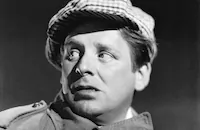
Wallace Ford

Alice White

Hale Hamilton
Albert Gran

Marjorie Gateson
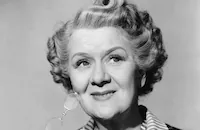
Ruth Donnelly
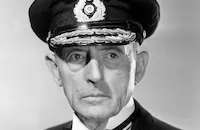
Frank Reicher

Charles Sellon

Allen Jenkins
Zita Moulton
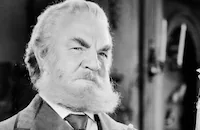
Berton Churchill
Helen Mann
Frank Mcglynn
Sam Godfrey

Edward Mcwade
Reverend Neal Dodd
H. C. Bradley
Henry Stockbridge
Crew

Videos
Movie Clip

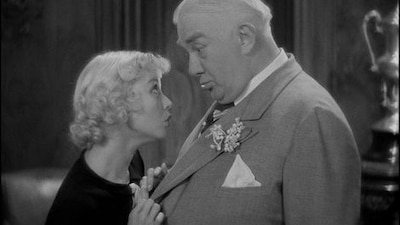


Trailer
Film Details
Technical Specs

Articles
Employees' Entrance
A recent expose of corporate scandal? No, this was the ad copy for Employees' Entrance (1933), a shocking pre-code movie with a surprising relevance to today.
Warren William stars as the appropriately named Kurt Anderson, a corporate hotshot brought in to save Franklin Monroe & Co., the world's largest department store. The Depression has hit the store hard but Anderson sweeps aside all excuses. When one of the board of directors opines that, "I don't know if there's very much to be said. There's a depression and everybody's affected. I should say the thing to do is retrench, economize;" Anderson barks back, "Get out! You're dead weight!" The board member soon becomes literally dead weight, committing suicide. Anderson sheds no tears. "When a man outlives his usefulness, he ought to jump out a window!"
William with his lean, wolfish features, is one of the most enjoyable actors of the early 1930&'s, that time before strict enforcement of the Motion Picture Production Code. The lack of restraint allows William to create a complex portrait of a ruthless but successful business titan. Just as we begin to enjoy his dynamic, take-charge personality, Anderson seduces a much-younger, naive employee (Loretta Young), and then sets out to destroy her marriage to his top salesman, Martin West (Wallace Ford).
Even at the time of its release, reviewers noted William's ability to make this scoundrel attractive. Released just weeks after President Franklin Roosevelt's inauguration, Employees' Entrance provided what audiences mired in the depths of the Depression wanted; a strong man who would take charge and get the economy moving again. Fortunately, the film also showed some of the damage such a dictatorial character could do.
Warren William was not Warner's first choice to play the role of the hard-charging executive. Edward G. Robinson was offered the role but turned down the part along with many others, causing some grief between him and the studio. Alice White, who plays Polly Dale, the bait Anderson uses to destroy his business rivals, had been a big star for Warner Brothers in the late silent/early sound era but her fame had waned when the flapper type with which she was associated went out of style. Reviewers favorably noted her performance here and it was considered a comeback role but a scandal later that same year sent her back to the ranks of supporting players.
Although based on a play, Employees' Entrance had a touch of the ripped-from-the-headlines quality shared by many of the Warner Brothers' movies of the early 1930's. Variety speculated that the story referred to Klein's department store in New York, which had enjoyed an unaccountable success during the Depression. Hale Hamilton's character, Monroe, with his many City Hall connections, was assumed to be a parody of New York's "official greeter" Grover Whalen.
Employees' Entrance is one of the great surprises unearthed from the formerly banned vault of pre-code films and is highly recommended to any who wish to sample the audacity and frankness that briefly flourished in the early 1930's.
Producer: Lucien Hubbard
Director: Roy Del Ruth
Screenplay: Robert R. Presnell, Sr.
Art Direction: Robert M. Haas
Cinematography: Barney "Chick" McGill
Editing: James Gibbon
Music: Leo F. Forbstein
Cast: Warren William (Kurt Anderson), Loretta Young (Madeline West), Wallace Ford (Martin West), Alice White (Polly), Albert Gran (Ross), Allen Jenkins (Sweeney), Marjorie Gateson (Mrs. Hickox).
BW-75m. Closed captioning.
by Brian Cady

Employees' Entrance
Quotes
Trivia
Notes
Film Daily notes that Hale Hamilton replaced Walter Walker. According to Warner Bros. production reports in the AMPAS files, the film took twenty-three days to shoot and was made for a total cost of $188,000. Some contemporary sources credit the actor playing "The man" as either Frank or Sam Godfrey and credit both Henry Stockbridge and H. C. Bradley as "Meek." Modern sources add Muriel Gordon to the cast.















